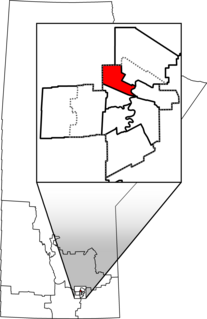
The Legislative Assembly of the Northwest Territories, or Legislative Council of the Northwest Territories, is the legislature and the seat of government of Northwest Territories in Canada. It is a unicameral elected body that creates and amends law in the Northwest Territories. Permanently located in Yellowknife since 1993, the assembly was founded in 1870 and became active in 1872 with the first appointments from the Government of Canada.

Beauce is a federal electoral district in Quebec, Canada, that has been represented in the House of Commons of Canada since 1867. In 2006, it had a population of 103,617 people, of whom 82,123 were eligible voters.

Alexander Morris was a Canadian politician. He served in the cabinet of Prime Minister John A. Macdonald (1869–1872), and was the second Lieutenant Governor of Manitoba (1872–1877). He also served as the founder and first Lieutenant Governor of the District of Keewatin.

Winnipeg North is a federal electoral district in Canada that has been represented in the House of Commons of Canada since 1917. It covers the northern portion of Winnipeg, Manitoba.

Pontiac is a federal electoral district in western Quebec, Canada, that has been represented in the House of Commons of Canada from 1867 to 1949 and since 1968.

The District of Keewatin was a territory of Canada and later an administrative district of the Northwest Territories. It was created in 1876 by the Keewatin Act, and originally it covered a large area west of Hudson Bay. In 1905, it became a part of the Northwest Territories and in 1912, its southern parts were adjoined to the provinces of Manitoba and Ontario, leaving the remainder, now called the Keewatin Region, virtually uninhabited. On April 1, 1999, the Keewatin Region was formally dissolved, as Nunavut was created from eastern parts of the Northwest Territories, including all of Keewatin.

Kildonan—St. Paul is a federal electoral district in the Winnipeg Capital Region of Manitoba, Canada. It has been represented in the House of Commons of Canada since 2004.

Strathcona was a provincial electoral district for the Legislative Assembly of Alberta, Canada. It is not to be confused with Edmonton-Strathcona, a different provincial electoral district within the city of Edmonton created in 1971, nor with the federal electoral district Edmonton—Strathcona.

The Northwest Territories general election of 1902, occurred on 21 May 1902 and was the fifth general election in the history of the Northwest Territories, Canada. It was held to elect Members of the Legislative Assembly of the Northwest Territories. This was the last election held until 1951, and was the last in the Northwest Territories to have political parties.
The Northwest Territories general election of 1888 was the first general election in the history of the Northwest Territories, Canada. Elections were held in various districts between 20 June and 30 June 1888. This was the only general election, where the writs were issued to return on various days.

The history of Northwest Territories capital cities begins with the purchase of the Territories by Canada from the Hudson's Bay Company in 1869, and includes a varied and often difficult evolution. Northwest Territories is unique amongst the other provinces and territories of Canada in that it has had seven capital cities in its history. The territory has changed the seat of government for numerous reasons, including civil conflict, development of infrastructure, and a history of significant revisions to its territorial boundaries.
Elections NWT is an independent, non-partisan public agency responsible for the administration of territorial general elections, by-elections, and plebiscites in accordance with the Elections and Plebiscites Act. Elections NWT is headed by the Chief Electoral Officer, an officer of the Legislative Assembly of the Northwest Territories.
The New Democratic Party of Canada ran a full slate of candidates in the 1993 federal election, and won nine seats out of 295. This brought the NDP below official party status in the House of Commons of Canada for the first, and to date only time in its history.
Lena Pedersen or Lena Pederson is a politician and social worker from Nunavut, Canada. In 1959, she moved from Greenland to the Northwest Territories and lived in Coppermine (Kugluktuk), Pangnirtung and Rae (Behchoko) before moving to Cape Dorset where she participated in the artwork sales of the West Baffin Eskimo Co-operative.
Richard Nerysoo is a territorial level politician from the Northwest Territories, Canada. He was a member of the Northwest Territories Legislature from 1979 to 1995 and served as the third Premier and Speaker.
Dr. Major Harold Wigmore McGill was a Canadian physician and politician provincial. He served in the Legislative Assembly of Alberta and the Council of the Northwest Territories.
Michael McLeod is the current Member of Canadian Parliament representing the Northwest Territories. He was first elected in 2015 Canadian federal election unseating Dennis Bevington, who was the former New Democratic Party MP for the riding. McLeod was a former member of the Legislative Assembly of the Northwest Territories, Canada, as well as the former mayor of Fort Providence.
Mark Evaloarjuk, CM was a northern Canadian business pioneer and politician. He served as a member of the Northwest Territories Legislature from 1975 until 1983, and served as President of Arctic Cooperatives Ltd. In 1981, he became inducted as member of the Order of Canada.











